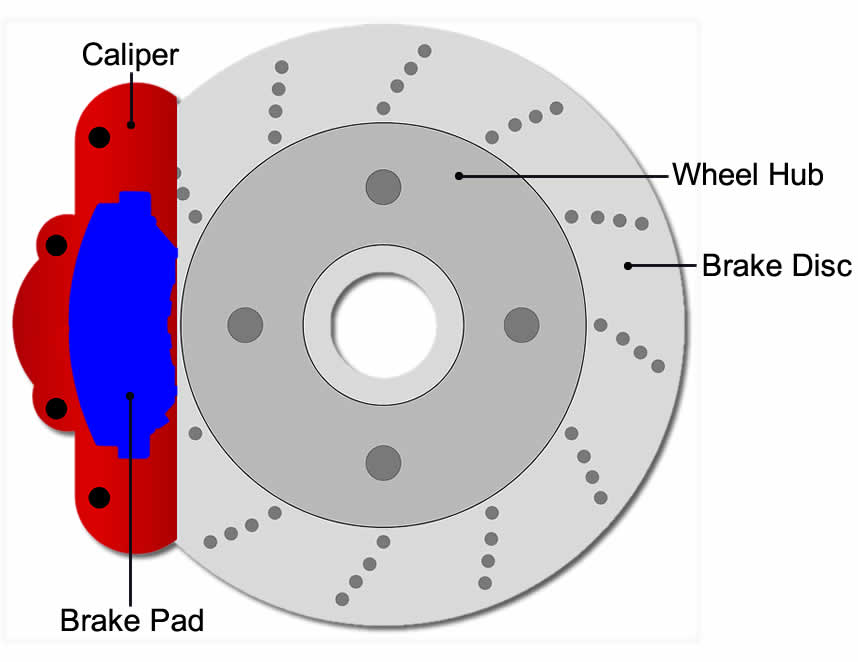How Many Miles do Brake Pads Last?
There’s no specific amount of miles that a set of brake pads will last due to there being many factors that determine this, but a set of brake pads will last anywhere from 25,000 miles up to 65,000 mile or more. The factors that determine how long a set of brake pads last are:
- What the brake pads are made of
- The type of roads you frequently drive on
- Your driving style
What the Brake Pads are Made From
There are different types of brake pads that offer certain benefits. The benefits of organic brake pads is price but being cheap means they don’t last very long. At the other end are ceramic brake pads which are beneficial due to being long-lasting, but they do come at a price. Most cars use metallic brake pads which offer a mid-price range along with an average mileage falling somewhere between organic and ceramic.
Road Types that Impact Brake Pad Wear
If you primarily use motorways, you’ll probably notice that your brake pads last a long time before wearing low. This is simply due to far less stopping and starting that’s consistent with town and city driving.
How to Reduce Brake Pad Wear

Your driving style has a significant impact on brake pad wear. Tips to reduce brake pad wear include:
- Engine braking – this is where you allow your vehicle to slow down by taking your foot off the accelerator and allowing the engine to slow you down rather than the brakes. This requires anticipating traffic ahead, by leaving a safe following distance between you and the vehicle in front and slowing down using engine braking before applying the brakes if you need to stop. So the next time you see a traffic queue up ahead, don’t accelerate to a stop, but rather reduce speed gradually using the engine. This technique not only reduces brake pad wear, but improves fuel economy.
- Avoid heavy braking – heavy braking is usually the result of excessive acceleration or high speed. Heavy braking heats up the pads and significantly contributes to brake pad wear. There’s really nothing more that burns off brake padding than heavy braking!
- Remove unwanted baggage – Quite simply, the heavier your car is, the greater the force that’s required to slow down or stop. Keeping your vehicle as light as possible reduces brake pad wear and improves fuel economy.
When Should You change Brake Pads?
Brake pads start their life with around 12 mm of friction material and when they wear to around 3 mm, it’s time to replace them. These are tips on when your brake pads may require replacing.
Warning Light
If your car is fitted with brake pad sensors, you’ll have a dashboard warning light pop up on the instrument panel informing you that brake pads require changing. However, not all vehicles have this feature. See dashboard warning lights for the type of warning symbol that may illuminate.
Screeching When Braking
Some brake screeching or grinding is normal, for example if you have left your car parked out overnight on a damp night, a thin layer or rust quickly forms on the brake disc. However, this should quickly wear off as you drive. The same may apply if you do not use your car too frequently. If the sound continues, have your brakes checked as soon as possible as your brake pads may require changing.
If the screeching or grinding sound continues, it could be a sign that the brake wear indicators are touching the metal brake disc. These metal wear indicators are attached to brake pads and as the pads wear low, the metal indicator comes in contact with the brake disc causing a screeching or grinding sound. Have your brake pads checked as soon as possible. If the friction pad is gone, you’ll damage the brake discs which cost significantly more to replace.
Pulling to Once Side When Braking
The car pulling to one side when braking is usually due to a brake fault and can cause uneven brake pad wear. Whatever the fault is, get it checked as it’s likely to get worse and reduce your ability to stop the vehicle effectively and increasing your chance of an accident.
Vibrations When Braking
If you can feel vibrations in the brake pedal and/or the steering when braking, it’s a sign of a defect in the brakes. This is often due to a warped brake disc due to excessive heat and is often caused by prolonged heavy braking. It’s possible the brake pads have also suffered damage.
| More about brake pads |
|---|